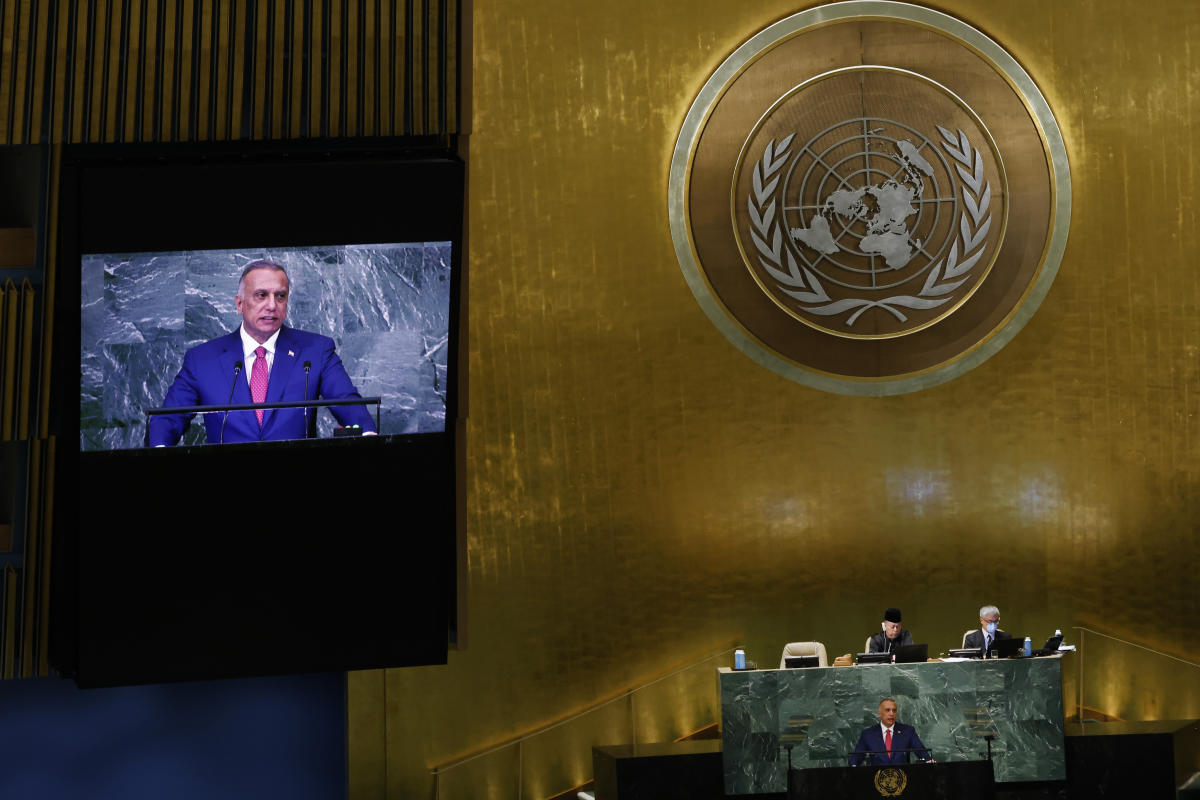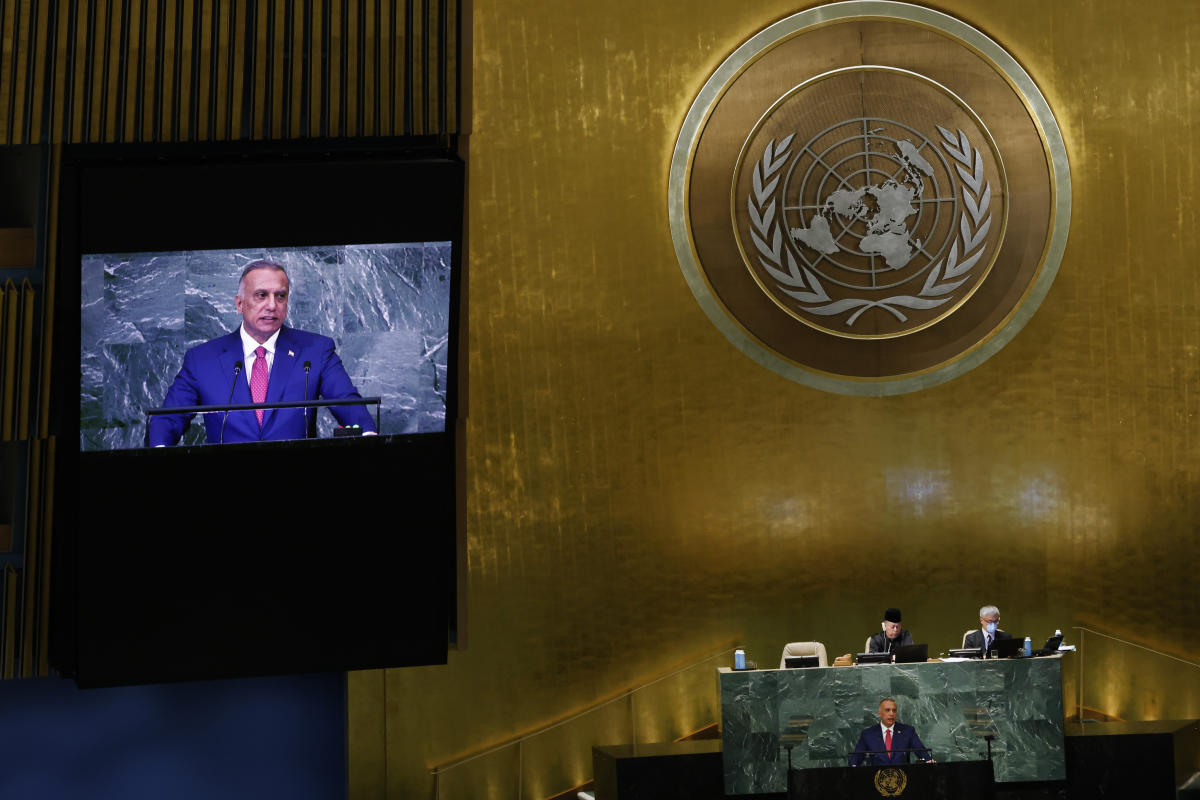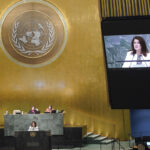
UNITED NATIONS (AP) — Pakistan’s new prime minister stepped onto the U.N. podium and faced world leaders, ready to spin a tale of floods and climate change and more than 33 million people at risk. Shahbaz Sharif began: “As I stand here today to tell the story of my country …”
At its core, that was what every world leader was here to do during the past week.
One after another, they took the stage — different leaders from different traditions that, under a single roof, reflected most of the world’s history. All had a fleeting opportunity to craft a story about their nation and the world that would — they hoped — make others sit up and listen. Some did it better than others.
We are storytellers, we humans. And even in an era of globalized politics and instantaneous streaming simulcasts, the story — the way it’s told, the details used, the voice and the cadence and the passion (or lack thereof) — can win the day.
Yet the dawn of storytelling at scale over the past two decades — regular people amplified globally right next to world leaders, and entire industries devoted to disseminating disinformation across continents — makes it harder for even the most powerful to get their messages noticed.
“In a public-discourse environment where people are just choosing to believe what they wish to believe, the challenge for a speaker at the U.N. is tremendous,” said Evan Cornog, author of “ The Power and the Story: How the Crafted Presidential Narrative Has Determined Political Success.”
“It is so hard to break through,” Cornog said. “And I think it’s become much harder. In Dwight D. Eisenhower’s age of politics, there was more of a predisposition to think, ‘I should listen to this person.’ Today the predisposition is, ‘This is all propaganda, and I should pay no attention to this.’”
Nevertheless, to watch a week of what is effectively an open-mic night for the people who rule the world revealed that in the attention economy, particularly for nations that aren’t in the spotlight at the moment, how you tell the story can make all the difference.
Urgency was a key theme. “Inflection point” came up a lot, as did “the moment to act.” Said Bharat Raj Paudyal, Nepal’s foreign secretary: “We are living indeed in a watershed moment.”
Tandi Dorji, the foreign minister of Bhutan, read a letter from a child about climate change. “Help and save our tiny village from global warming,” it said, and it was hard not to stop and notice.
Other speeches were more workaday. Some were simply bullet points about priorities. Some were adjective-rich screeds about old enmities. Some were, bluntly, quite wonky.
Yet some leaders (or their speechwriters) have honed storytelling to a persuasive art. Ukraine’s Volodymyr Zelenskyy, for example, got a dispensation to be the only world leader allowed to speak on video this year thanks to his status as a wartime president. In doing so, he got handed some advantages:
He controlled the production values. If he made a mistake, he could rerecord. Most of all, he could take advantage of the storytelling optics that have served him so well since Russia invaded — his trademark olive T-shirt, his flag in the background, his ability to dominate his own environment rather than be framed in the same green marble as everyone else.
Then there is the case of Ralph Gonsalves, prime minister of the island nation of Saint Vincent and the Grenadines. His speech Saturday brimmed with metaphors and language that some might call epic and others grandiose — but were highly noticeable either way.
“I ask the relevant and haunting questions: What’s new? Which world? And who gives the orders? The future of humanity depends on satisfactory answers to these queries,” Gonsalves boomed.
Storytelling, of course, goes beyond oratory — even in the context of a speech. Some of the most memorable U.N. stories have been told by leaders who went past words.
Consider Soviet leader Nikita Khrushchev, whose fabled shoe-banging at the 1960 General Assembly was a defining moment of his public life — and he wasn’t even at the podium at the time. And Libya’s Moammar Gadhafi, who spent 1 hour and 36 minutes uncorking his anger at the United Nations before pulling out a copy of its charter and ripping it up.
Most speeches are not that lively and, in fact, would be boring to many people. That’s in part because the storytelling is often aimed at audiences different from a general international one.
Sometimes a story is intended for fellow assembled leaders, or for a specific leader (many U.N. General Assembly speeches have been delivered for an audience of one: the president of the United States). Sometimes it is intended for a financial institution, like the World Bank. Sometimes it is told for a domestic media audience, or for the people of a country next door.
“They’re still learning. Heads of state are learning how to tell stories, how to use this format to get their message out there,” said William Muck, head of the political science department at North Central College in Illinois.
“They’re not always great storytellers,” he said. “But we now have the means and the technology to share those stories. So somebody who’s adept at storytelling can really thrive in that space.”
One story that faded into the background some this year: that of COVID-19. The dominant narrative at both the all-virtual 2020 U.N. General Assembly and the hybrid 2021 edition, it receded to a B-story this time around as war, climate change and food insecurity elbowed to the front row. Beyond the global desire to move on, there seemed to be recognition that it was time for other stories.
Just outside the General Assembly Building this month, a mockup of an outdoor classroom with pupil desks and backpacks was set up for a summit on transforming education. Every day, delegates walked past and saw these words etched on the blackboard: “Only one in three 10-year-olds globally can read and understand a simple story.”
The message was clear. Telling stories, understanding them and casting both an appreciative and a critical eye on them sit at the heart of 21st-century literacy. It is a central part of being a citizen, a smart consumer — and a leader.
It is also, as some here say, a way station on the path toward what the United Nations covets most of all: peace.
___
Ted Anthony, AP’s director of new storytelling and newsroom innovation, has been writing about international affairs since 1995 and has supervised U.N. General Assembly coverage since 2017. Follow him on Twitter at http://twitter.com/anthonyted and, for more AP coverage of the UNGA, visit https://apnews.com/hub/united-nations-general-assembly




